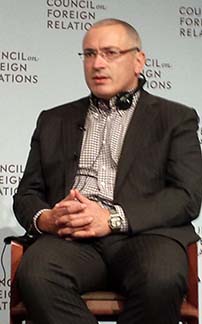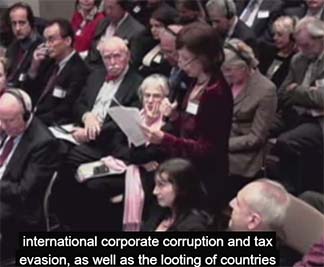By Lucy Komisar
Oct 6, 2014
Mikhail Khodorkovsky is “doing” the U.S. He appeared on big-time celebrity TV and I saw him today at the Council on Foreign Relations. After some dicey years as a Russian “oligarch” (a euphemism for a corrupt guy who loots the Russian patrimony), he became a “reformer” and was jailed by Vladimir Putin, serving ten years for tax evasion and related crimes. (Other oligarchs did the same crimes, but they got a pass, because they didn‘t challenge Putin.)
Yes, he was targeted for political reasons, but what about what he actually did? Siphon profit out of his companies via offshore shell companies, thereby cheating minority shareholders and (via tax evasion) the Russian people. (details below). How does he deal with it?

The most fascinating comment he made at the Council was:
“Here, take a look at how the Russian person views what the West is doing today. People around Putin have plundered the Russian budget. This is obvious enough for the majority of Russians. Likewise easy enough to see is that they did not keep this money in Russia, but took it out to the West. Everybody understands that you knew about this.
Then they put this money into Western real estate, Western banks, into their good life and the good life of their families in the West, and everybody knows that you knew about this, and you were fine with the fact that the Russian people are being plundered.
Then, Russia took an independent policy stance with respect to international questions. Whether it’s a correct position or incorrect position, we’re not going to discuss that now. It was an independent position. And you started punishing Russia — that is, you’re not punishing for a moral position, because that’s to your benefit. You are punishing for an independent foreign policy, because apparently this, too, is to your advantage.”
And how did the money leave Russia? He knows. Through offshore shell companies.
At question time I said:
QUESTION: I’m Lucy Komisar, a journalist. I want to take off from what you said about Mr. Putin and his friends sending money outside of Russia. Regarding two firms you controlled, I have documents from the London office of Yukos oil company and papers from an Isle of Man court filing concerning the titanium sponge maker AVISMA, which show that when you controlled those firms, you used offshore shell companies to skim their profits, cheating minority shareholders of their rights and Russian citizens of taxes.

Now that you say you are a reformer, why don’t you acknowledge what you did in the past and speak out against the offshore shell company system that enables international corporate corruption and tax evasion, as well as the looting of countries by corrupt government officials and leaders such as Mr. Putin and his friends?
KHODORKOVSKY (through translator): I always enjoy speaking about mistakes that were made at the beginning of the development of capitalism in Russia, at the very least because I am one of the few who has paid for his part of the mistakes. (APPLAUSE)
Nevertheless, I do not feel myself so much of a moral authority to be able to speak about how international business as a whole is set up, what with offshores, not offshores, with states of Delaware, without states of Delaware. (LAUGHTER)
There are people far more competent than I to address these questions. What I do say — and which, by the way, I told Putin in 2003 — is that even if we can’t be totally moral we shouldn’t use this to justify the fact that we’re totally amoral.
The plundering of the Russian budget has become too total. And that is something that should be spoken about and that I have the right to speak about this, because this is the premise under which I was sent to jail.
His comments about Delaware indicate that Khodorkovsky understands very well how the shell company system works. And how very sad that he doesn‘t take this opportunity to work for an important international change that could reduce the ability of Putin and friends to loot Russia.
Is that because it also challenges friendly western governments or corporate interests? Or does Khodorkovsky, who lives in Switzerland (to be near his money?) still use the offshore shell companies for the cash he collected from his Yukos and AVISMA transfer pricing scams?
After the meeting, I talked with Khodorkosky’s son, Pavel, who runs a new Russian political analysis project from New York, and wondered why his father didn’t take the opportunity to show he really was a reformer by opposing the offshore system that allowed him, and now Putin, to steal. He said he would bring up the question.
Are you wondering about the APPLAUSE and LAUGHTER which appear to dismiss the significance of offshore corruption? In the 20 years I have been a Council member, and as the offshore corruption and tax evasion issue has gotten more and more public and political attention, the Council has never had a meeting dealing with it. Forget about a serious study or report.
I once was assigned to write an article on the subject for Foreign Affairs, the Council’s publication, but it was summarily killed by then editor James Hogue, because I had spoken too plainly about how the system facilitated tax evasion. He didn’t have the guts or courtesy to tell me. I learned it was killed when secretary asked, Where shall we send the kill fee? That and the reaction to Khodorkovsky might be because some banker-business-lawyer Council members, who dominate the organization, use the system for themselves or their companies to cheat on taxes. When I raised that with a prominent member, now with an investment firm, he said, But Lucy, taxes are too high!
CFR Text
CFR Video (Komisar question at 41:40)
About Khodorkovsky corruption: Deposition in US federal court of Dmitry Gololobov, former Menatep/Yukos lawyer, a whistleblower who told how they did it. Combination of Enron and Mafia. But, hey, Khodorkovsky was the Council’s honored guest. OK to be a crook as long as you attack Putin.


As always, your column is heuristic. I’m very glad you at least asked Khodorkovsky an important question, and you are still out there talking about the corruption that continues all over the world. You’re like Joan of Arc Lucy.
Thank you
Thank you again! Mr K’s answer to your question is revealing not only of his individual position, but also of some important dimensions of American-Russian economic and political relations.
Pingback: Khodorkovsky’s Contradictions from Komisar Scoop | Roger Short
I think that your interview was interesting and I am glad you asked him the question. However, you exhibit quite a bit of judgement towards him [as] “real reformer”. Of course he understands the off-shoring well. He was pointing out that America isn’t exempt from it–obviously.
It is about as ridiculous as the British Parliament interrogating the American companies for something that they have done for just as long and better (at one point in time). The Russians arrived late to the game, played it fast and furious, and probably still do.
That President of theirs is notorious for dealing with people that speak out. Getting ten years demonstrated that he still liked this guy, he might not be as nice the next time around. Suggesting that he speak out again might be a bit naive on the author’s part.
LK: Thanks for comment. Of course I know that MBK was a crook, but I had to pose the question in a way that gave him the opportunity to admit and discuss what he did. And as a “reformer” commit to work to end the scam. But, he finessed it. Not a surprise. He is hardly a reformer. But I thought it relevant to raise the issue before members of the Council on Foreign Relations, including people of the financial and corporate world who know quite well that their companies use offshore to cheat.
Splendid question to dear old Michael, because when he had his finest hour before Siberia he and others of the Menatep/Yukos jamboree hired all sort of UK financial experts like Stephen Curtis (died in a helicopter crash) and good old Peter Michael Bond for AML and ABC purposes.
Of course he broke the gentlemen’s agreement with the Putin administration not to interfere with politics, but he has also dirty hands transferring “his” money through the financial system.
But the main reason of his downfall was a geopolitical game about oil and gas between Russia and the US, and dear old Michael was nothing more and nothing less than an asset in the theatre of chess.